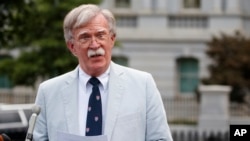U.S. President Donald Trump wants to see a successful British exit from the European Union that Washington will support with a U.S.-UK free trade agreement, national security adviser John Bolton told British officials on Monday.
As Britain prepares to leave the European Union on Oct. 31, its biggest geopolitical shift since World War II, many diplomats expect London to become increasingly reliant on the
United States.
Bolton, in London for two days of talks with British officials, is seeking an improved U.S.-British relationship with Prime Minister Boris Johnson after sometimes tense ties between
Trump and Johnson's predecessor, Theresa May.
A central message Bolton was making is that the United States will help cushion Britain's exit from the EU with a free trade deal that is being negotiated by U.S. Trade Representative
Robert Lighthizer and his British counterpart, Liz Truss.
A senior Trump administration official, describing Bolton's message to British officials, said the president "wants to see a successful British exit from the European Union" and that a
trade deal would help Britain.
Trump had wanted to work with the May government on a trade deal but her government "didn't want do it. This government does. We're very happy about it," the official told reporters travelling with Bolton.
Trump believes that "when it comes to trade negotiations the EU is worse than China, only smaller", the official said.
Johnson spoke to Trump on Monday, discussing Brexit, trade and economic issues, his office said. "They discussed global economic issues and trade, and the prime minister updated the
president on Brexit," Downing Street said.
"The President expressed his appreciation for the United Kingdom's steadfast partnership in addressing global challenges and looks forward to meeting with him (Johnson) personally in
the near future," the White House said.
Iran and China
After breakfast with British Conservative Party lawmaker Bernard Jenkin, Bolton had lunch with Britain's Cabinet secretary, Mark Sedwill, and also met Johnson. He is due to meet
Sajid Javid, the new chancellor of the exchequer, on Tuesday.
Bolton is expected to urge officials from Johnson's newly formed, eurosceptic government to align its policy on Iran more along the lines of the United States, which has pushed a much tougher line against Tehran since withdrawing from world powers' 2015 nuclear agreement with Tehran.
Britain, one of three European partners to the deal along with Germany and France, has so far backed the EU in sticking with the accord known as the Joint Comprehensive Plan of Action.
But the seizure of a British oil tanker in the Strait of Hormuz by Iran last month has put pressure on London to consider a more robust stance.
British marines seized an Iranian vessel, which is suspected of smuggling oil to Syria, off the coast of Gibraltar on July 4.
This month, Britain joined the United States in a maritime security mission in the Gulf to protect merchant vessels.
Trump has also sought Britain's help in getting tougher on the Chinese telecommunications firm Huawei out of concern that its next-generation 5G technology represent a national security risk. Washington wants its allies, including Britain, to avoid using equipment from Huawei.
In April, Britain's National Security Council, then chaired by May - met to discuss Huawei and a decision was made to block the company from all critical parts of the 5G network but to give it restricted access to less sensitive parts.
But Bolton hopes to find a more friendly audience on the topic from the Johnson government. A final decision has yet to be taken by the British government.





